|
Boat Dock
In the morning, I headed back to the dock to check out the situation. Something was definitely going to happen this morning, but judging by the other backpackers milling around, it wasn't happening just yet. So, I took a seat at a small restaurant overlooking the river and decided to take some breakfast. Just as I
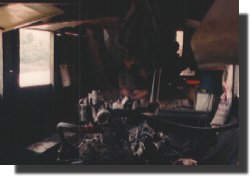 had walked in, another couple backpackers were sitting down, presumably with the same plan as me. As soon as I had taken a seat, a couple tables over from theirs, the woman, a German, starts explaining to the man, whom she had just met, how "foreigners out here who pretend not to notice each other are neurotic... people should be more friendly..." The woman has a point. Part of the goal of my traveling through southern China and into Laos is to get away from home and escape a bit of the pre-programmed society that I grew-up in. So, when I run into other people from Chicago or London or wherever, it kind of spoils the escape for me. Evidently, this is the way a lot of backpackers look at the situation, and that's why they don't just walk over to her table and introduce themselves as a fellow European.
had walked in, another couple backpackers were sitting down, presumably with the same plan as me. As soon as I had taken a seat, a couple tables over from theirs, the woman, a German, starts explaining to the man, whom she had just met, how "foreigners out here who pretend not to notice each other are neurotic... people should be more friendly..." The woman has a point. Part of the goal of my traveling through southern China and into Laos is to get away from home and escape a bit of the pre-programmed society that I grew-up in. So, when I run into other people from Chicago or London or wherever, it kind of spoils the escape for me. Evidently, this is the way a lot of backpackers look at the situation, and that's why they don't just walk over to her table and introduce themselves as a fellow European.
Passengers
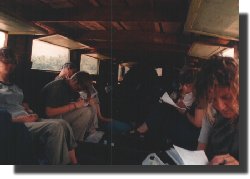 Anyway, the reason I explain this in length is that other people coming to Laos are surely looking to get away a bit and see a different culture, experience a different way of thinking. Most of the people waiting around the boat dock that morning had come over from Thailand, where there are plenty of tourists and English speakers. I am guessing all of them had the same vision of hopping a local boat for a peaceful ride down the Mekong. We all avoided the "express boat" which would get you to Prabang in the same day, and opted for the quieter, slower ride. Well, the boat (and don't get me wrong- this is the best thing to do in Laos) is equipped with a loud diesel engine and carries a cargo of exclusively foreign backpackers. We all spent the first hour sitting inside the cramped hull of the boat staring at each other, a bit disappointed by the whole experience.
Anyway, the reason I explain this in length is that other people coming to Laos are surely looking to get away a bit and see a different culture, experience a different way of thinking. Most of the people waiting around the boat dock that morning had come over from Thailand, where there are plenty of tourists and English speakers. I am guessing all of them had the same vision of hopping a local boat for a peaceful ride down the Mekong. We all avoided the "express boat" which would get you to Prabang in the same day, and opted for the quieter, slower ride. Well, the boat (and don't get me wrong- this is the best thing to do in Laos) is equipped with a loud diesel engine and carries a cargo of exclusively foreign backpackers. We all spent the first hour sitting inside the cramped hull of the boat staring at each other, a bit disappointed by the whole experience.
Up On Top
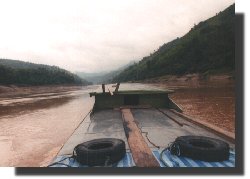 But after a few second thoughts and a little enginuity, half of us migrated to the top of the boat leaving plenty of room for those inside to spread out and enjoy their books or take a nap. I passed some of the time talking to a Japanese couple who had quit work back home in favor of a long trek through Asia. We passed the time playing cards, admiring the scenery, and imagining the surprise of the first explorers who came up this river long ago (or better yet, the enginuity of the local traders who had been using this river even longer before that).
But after a few second thoughts and a little enginuity, half of us migrated to the top of the boat leaving plenty of room for those inside to spread out and enjoy their books or take a nap. I passed some of the time talking to a Japanese couple who had quit work back home in favor of a long trek through Asia. We passed the time playing cards, admiring the scenery, and imagining the surprise of the first explorers who came up this river long ago (or better yet, the enginuity of the local traders who had been using this river even longer before that).
Pakbeng Layover
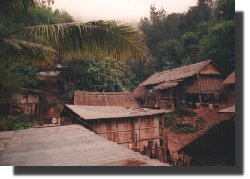 After a full day of steady progress down the wide muddy Mekong, we pulled up to Pakbeng for the night. Pakbeng is much bigger than most of the other villages we had passed by because it has both a port and a major road linking it to the rest of the area. Still, it is basically a one-road town, and a long walk up this road only yielded four or five guesthouses, all set-up to take-in backpackers like us that came in on the slow boat every other day. I picked one based on a complex ten-point inspection system (see view from my window in the photo at left), and headed out for a walk.
After a full day of steady progress down the wide muddy Mekong, we pulled up to Pakbeng for the night. Pakbeng is much bigger than most of the other villages we had passed by because it has both a port and a major road linking it to the rest of the area. Still, it is basically a one-road town, and a long walk up this road only yielded four or five guesthouses, all set-up to take-in backpackers like us that came in on the slow boat every other day. I picked one based on a complex ten-point inspection system (see view from my window in the photo at left), and headed out for a walk.
A Walk in the Park
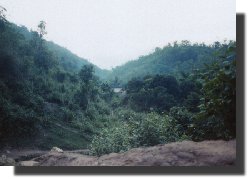 As the day's light was quickly disappearing over the surrounding hills, I trodded further up the road, out of town, and on to a little footpath. A few hundred meters along this steep path heading into the jungle, I passed a few men going in the other direction. Not knowing whether I was imposing on their farmland or breaking some tribal rule, for the first time in my life, I had crazy visions of headhunters and the like. But my fears were quickly put to rest as the men smiled a bit and almost seemed to encourage me further along the path. Another kilometer in, and I thought that I could see a village up ahead.
As the day's light was quickly disappearing over the surrounding hills, I trodded further up the road, out of town, and on to a little footpath. A few hundred meters along this steep path heading into the jungle, I passed a few men going in the other direction. Not knowing whether I was imposing on their farmland or breaking some tribal rule, for the first time in my life, I had crazy visions of headhunters and the like. But my fears were quickly put to rest as the men smiled a bit and almost seemed to encourage me further along the path. Another kilometer in, and I thought that I could see a village up ahead.
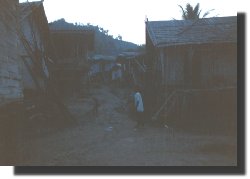 A bit more walking, almost dark now. Yes, it was a village. This path must be the cargo highway running past a number of villages, I thought. Nothing wrong with taking a look. The path actually took me right through the center of this village, and though my little stroll didn't seem to bother anyone, I did attract a lot of attention. I pretended like I had some intended destination just on the other side of the village, but as I neared the far side of the village, I realized the path didn't seem to lead pack out this way. So I stopped short and took a look around at the entourage I had accumulated. Every kid under ten from the village (amounting to more than 20 kids) was hanging around me giggling, pointing fingers, and trying to guess what I would do next. One older kid, maybe 15 years of age, stepped forward as the representative of this group. Not knowing each other's languages we managed only the following conversation:
A bit more walking, almost dark now. Yes, it was a village. This path must be the cargo highway running past a number of villages, I thought. Nothing wrong with taking a look. The path actually took me right through the center of this village, and though my little stroll didn't seem to bother anyone, I did attract a lot of attention. I pretended like I had some intended destination just on the other side of the village, but as I neared the far side of the village, I realized the path didn't seem to lead pack out this way. So I stopped short and took a look around at the entourage I had accumulated. Every kid under ten from the village (amounting to more than 20 kids) was hanging around me giggling, pointing fingers, and trying to guess what I would do next. One older kid, maybe 15 years of age, stepped forward as the representative of this group. Not knowing each other's languages we managed only the following conversation:
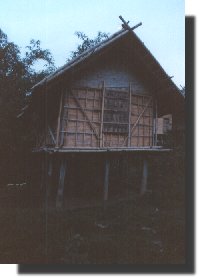 "Where are you from?" Canada
"Where are you from?" Canada
And you, where are you from? "this village"
"What do you do here?" just walking; I take the boat
What is this building for? "rice"
"What is your name?" Aaron, and you
didn't catch it Well, er "Take my picture" this came only after I had produced the camera in preparation for taking a picture of the rice storage house.
The kids were all pretty excited about the workings of my camera. I handed it over to one of them to take a picture of me and my new friend. By this point, it was pretty dark, I didn't turn on the flash. So it was important to keep the camera pretty steady for the photo. I didn't really expect the photo to come out, but it did. I didn't really expect to find my way back to my guesthouse on the unlighted footpath, but that worked out all right too. Sometimes if you just try things out, the results are better than you could have ever expected.
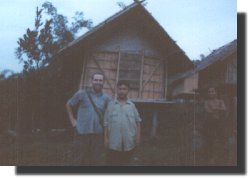
Thoughts on Communism
One of the goals of this trip was to get a brief view of something that is slowly disappearing. Actually, on a broad basis, that is always the goal of my travels, but this is the first time that I had a chance to observe communism. Honestly, growing-up a doubter of all people and things (that's why I have to see everything with my own eyes) I always assumed that communism got a bad rap. Too many people confuse a legitimate economic system with the totalitarian government that so often accompanies it. To me, the idea of increasing central planning of the economy from 30% (ie, the current level of government spending in capitalist US or UK) to 60-70% (the realm of government influence in Scandinavia?) or even 100% (communism?) didn't seem that crazy. I was a bit disappointed when the USSR and other economies fell apart at the end of the eighties and capitalism declared victory. Now, according to my count, the world only has five major countries left which consider themselves communist: China, Vietnam, Laos, Cuba, and one other one that I forgot, maybe North Korea. Anyway, even China and Laos don't claim to have pure communism anymore, but one wonders whether they ever did.
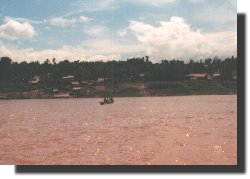 Looking at these photos, most people would quickly declare communism in Laos a failure. However, that hardly seems fair considering China and Laos have actually fared all right when compared with places like The Philippines and Indonesia, capitalist countries which have received the full support of the US government. Besides, Laos is physically and politically cut-off from the rest of the world, further complicating efforts to improve the lives of its residents. Anyway, one thing that is interesting to me (and I am not sure if this is a point in favor of communism or not) is the entrepreneurial spirit of people in China and Laos. They have a strong national system of support for all people, but you still see people who put-forth extra effort to better themselves by tending a garden at home, building a community building in the village, or selling a few things on the side. Honestly, though, for Laos, communism is relatively untested at this point, because a large part of the population lives on non-monetary means.
Looking at these photos, most people would quickly declare communism in Laos a failure. However, that hardly seems fair considering China and Laos have actually fared all right when compared with places like The Philippines and Indonesia, capitalist countries which have received the full support of the US government. Besides, Laos is physically and politically cut-off from the rest of the world, further complicating efforts to improve the lives of its residents. Anyway, one thing that is interesting to me (and I am not sure if this is a point in favor of communism or not) is the entrepreneurial spirit of people in China and Laos. They have a strong national system of support for all people, but you still see people who put-forth extra effort to better themselves by tending a garden at home, building a community building in the village, or selling a few things on the side. Honestly, though, for Laos, communism is relatively untested at this point, because a large part of the population lives on non-monetary means.
Day Two
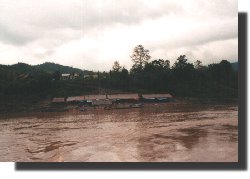 The following day presented much of the same. The Mekong shores are surpisingly underpopulated, considering the grandeur of the river itself. Most of the journey presents uninterupted views of tree-lined shores, with an occassional break in the foliage to demarcate a small boat jetty and a few homes. Yes, here was the raw jungle and untouched civilization I had always been searching for. I looked forward to our entree to Luang Prabang, once capital of this quiet region.
The following day presented much of the same. The Mekong shores are surpisingly underpopulated, considering the grandeur of the river itself. Most of the journey presents uninterupted views of tree-lined shores, with an occassional break in the foliage to demarcate a small boat jetty and a few homes. Yes, here was the raw jungle and untouched civilization I had always been searching for. I looked forward to our entree to Luang Prabang, once capital of this quiet region.
|